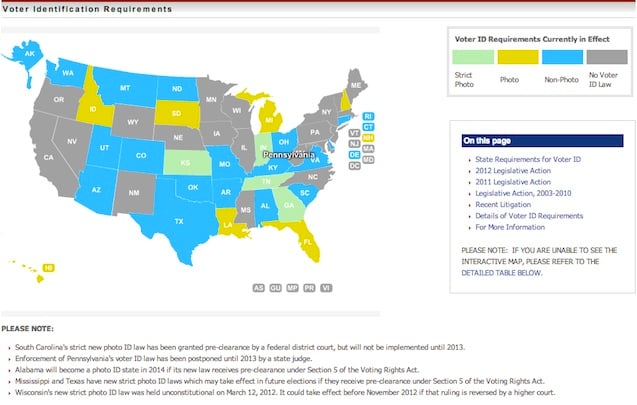
The debate over voter ID laws reached a boiling point this year. Since 2011, legislation to establish voter ID requirements or strengthen existing laws has been introduced in 34 states. Conservatives claim the laws are meant to curb voter fraud, but civil rights groups say that strict ID laws do little to prevent fraud and instead serve to disenfranchise poor and minority voters who tend to support Democrats.
Strict laws requiring a photo or government ID to vote have even been compared to the poll taxes of the Jim Crow era because voters must often take time off work and, in some states, pay bureaucratic fees to obtain IDs.
Republicans have established strict voter ID laws in several states requiring a form of photo or government identification in order to vote, but court battles in states like South Carolina and Pennsylvania have delayed implementation of these laws until after the 2012 election.
In the interactive map below, The National Conference of State Legislatures (NCSL) has provided a state-by-state breakdown of the details and requirements in the 33 states that require some kind of voter ID. The states colored mint green have strict photo ID laws, and states colored yellow have less strict photo ID laws. Blue states have non-photo ID laws and gray states do not have photo ID laws. Detailed information about each state is available at the NCSL web site.
More information on voting rights is available from the American Civil Liberties Union. If you encounter discrimination at the polls or are unable to vote for any reason, call the Nationwide Election Protection Hotline at 1-866-OUR-VOTE for help. You can also report any problems to the Lawyers Committee of Civil Rights here.
 (Click here to see full interactive map. )
(Click here to see full interactive map. )
Angry, shocked, overwhelmed? Take action: Support independent media.
We’ve borne witness to a chaotic first few months in Trump’s presidency.
Over the last months, each executive order has delivered shock and bewilderment — a core part of a strategy to make the right-wing turn feel inevitable and overwhelming. But, as organizer Sandra Avalos implored us to remember in Truthout last November, “Together, we are more powerful than Trump.”
Indeed, the Trump administration is pushing through executive orders, but — as we’ve reported at Truthout — many are in legal limbo and face court challenges from unions and civil rights groups. Efforts to quash anti-racist teaching and DEI programs are stalled by education faculty, staff, and students refusing to comply. And communities across the country are coming together to raise the alarm on ICE raids, inform neighbors of their civil rights, and protect each other in moving shows of solidarity.
It will be a long fight ahead. And as nonprofit movement media, Truthout plans to be there documenting and uplifting resistance.
As we undertake this life-sustaining work, we appeal for your support. Please, if you find value in what we do, join our community of sustainers by making a monthly or one-time gift.